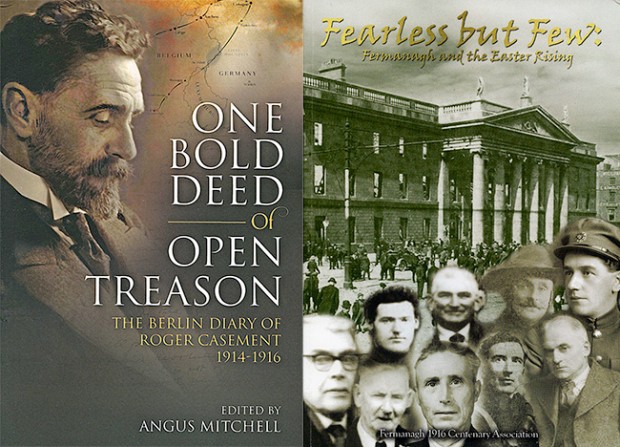11 April 2016 Edition
Fearless Fermanagh and Roger Casement in Germany
Book Reviews

One Bold Deed of Open Treason – The Berlin Diary of Roger Casement
Merrion Press. Edited By Angus Mitchell
THIS ABSOLUTELY FASCINATING book is an analysis of Roger Casement’s diaries covering the period 1914 to 1916, whilst travelling in America and Germany to consolidate support for the Irish cause.
Mention of Roger Casement’s name and the word “diaries” in the same sentence usually causes people to think of the infamous “Black Diaries”, alleged by the British authorities to have been written by Casement detailing homosexual encounters. Their authenticity has always been hotly contested, with the balance of probabilities pointing to the fact that Casement was indeed gay but that the diaries were forged, or at least embroidered to undermine the growing calls for clemency. This volume is not concerned with that controversy, with some 25 lines out of 270 pages concerned with it.
This volume details Casement’s soul searching as he considers the chances of success for the Rising at Easter, which he felt was doomed to failure but which he was nonetheless obligated to participate in. His detestation of the British Establishment, along with all the trappings of imperialism are clearly conveyed but so too is his growing frustration and despondency over the Prussian mindset which dominated the German high command and Foreign Office. The political intrigues and the growing realisation that the German military considered Ireland to be merely a distraction which might provide a convenient diversion from England’s concentration on the Western Front took a growing toll on his health.
There is a 13-month gap in the diaries during which Casement’s disenchantment is consolidated. Initially positive towards German methods and motives, by the time his writing resumes, he has become cynical and condemnatory. His failure to recruit an Irish Brigade made up of Irish prisoners of war from the ranks of the British Army he believed was due to German incompetence and lack of understanding of the Irish situation.
Casement’s wit and humanity shine through in his writing. In one passage he describes what he believes to be the naiveté of the American public in unquestioningly absorbing British propaganda of German atrocities: “I suppose there is no people in the world so gullible as the Americans. That is doubtless why they invented poker.”
This is a superb book on a maligned and often marginalised figure in Irish history. Now is the time to once again recognise his importance and restore him to his rightful place in the 1916 pantheon.
Fearless But Few: Fermanagh and the Easter Rising
Fermanagh 1916 Centenary Association
SOME people’s eyes may be beginning to glaze over at the prospect of yet another book on 1916 this slim little volume offers genuinely novel and fascinating insights into the people and events of the Easter Rising, providing a thoroughly engrossing view of some of the Fermanagh men who took part in the rebellion against the mighty British Empire.
It is evident from the outset that this book has been a labour of love for the Fermanagh 1916 Centenary Association, shining a light on the lives of the Fermanagh participants in the Rising. As the title of the book acknowledges, their numbers were few but their significance in carrying on a tradition that dated back to the United Irishmen is of signal importance.
The book traces the lives and participation of ten men – two Protestants and eight Catholics. Eight were members of the Irish Volunteers, one Citizen Army, and one Hibernian Rifles (which he had founded).
The book highlights the fact that Fermanagh in the early 1900s was not as divided along sectarian fault lines as one might assume, and that the tradition of radical Protestant republicanism still lingered. Indeed, the most blatantly sectarian act described in the book concerns the failure of the Ancient Order of Hibernians to back a Protestant Volunteer as a Sinn Féin election candidate!
This is obviously a book of particular interest to those with a Fermanagh connection but it is also relevant to a wider readership as it tells the story of “ordinary people who held down ordinary jobs . . . and who lived in extraordinary times and did extraordinary things. It is important a hundred years on that we remember them.”
The ultimate tragedy is that none of these Volunteers was able to live in their home county after partition.
• The book is available from local Fermanagh outlets or online from 1916fermanagh.blogspot.com priced £10/€13.



